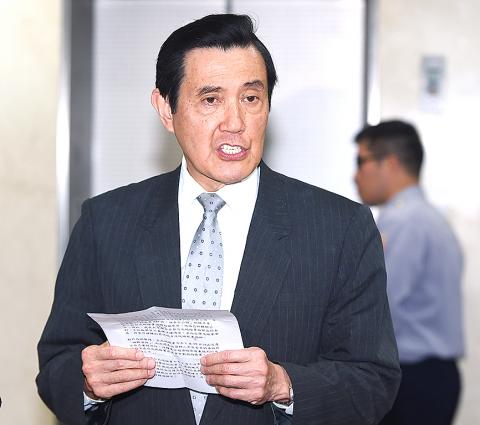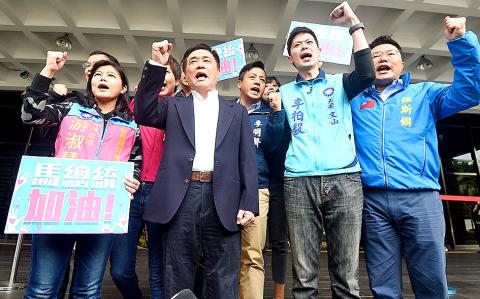Former President Ma Ying-jeou (馬英九) yesterday exercised his right to remain silent during questioning at the Taipei District Prosecutors’ Office as part of an ongoing inquiry into an alleged breach of financial regulations during the sale of three media companies formerly run by the Chinese Nationalist Party (KMT).
The KMT in 2005 sold Central Motion Picture Corp (CMPC, 中影), China Television Co (CTV, 中視) and Broadcasting Corp of China (BCC, 中廣), after an amendment to the Broadcasting and Television Act (廣播電視法) in 2003 barred political parties, the military and politicians from owning media outlets.
Ma, who was then-KMT chairman, is accused of illegally facilitating the sales of the media outlets below market value, which would be a breach of the Securities and Exchange Act (證券交易法).

Photo: Liao Chen-huei, Taipei Times
Ma left the office after four hours of questioning and immediately issued a statement, saying the prosecution is procedurally unjust and that he exercised his right to silence.
“Any neutral, objective and full examination of evidence will acquit me from allegations of criminality. Should the office have concerns other than these, I am not a pugnacious man, but I do not run from a fight,” he said.
Ma said the allegations leveled against him are “groundless accusations” and accused the prosecution of engaging a smear campaign through the media against his character and reputation.

Photo: Liao Chen-huei, Taipei Times
“It is my opinion that the office has breached the principles of objectivity and confidentiality under articles 2 and 245 of the Code of Criminal Procedure (刑事訴訟法),” he said.
The prosecutors have dismissed charges of breaching investigative confidentiality that Ma had filed against Chief Prosecutor Shing Tai-chao (邢泰釗) and Lead Prosecutor Wang Hsin-chien (王鑫健), and his request for remanding the case to another jurisdiction was also rejected, Ma said.
That the decision was made by a Taipei prosecutor surnamed Huang (黃), who is also investigating the sale of the media outlets, raises doubts over procedural correctness, Ma said.
Shing and Wang called a news conference on Dec. 13 last year to deny allegations of leaking information about their investigation before the case was registered formally, and attributed the leak to the media, Ma said, calling the move “rash.”
Ma vowed to continue exercising his right to silence during questioning until the legality of the investigation is affirmed and the office can prove itself to be unbiased.
Sources previously told the Chinese-language Liberty Times (sister paper of the Taipei Times) on condition of anonymity that Taipei prosecutors are in possession of an allegedly incriminating recording.
It is purportedly a recording of Ma’s conversation with former KMT-controlled Central Investment Co (CIC, 中央投資公司) general manager Wang Hai-ching (汪海清) over a dispute with CTV’s eventual buyer, Yu Chien-hsin (余建新).
Ma allegedly told Wang to concede to Yu’s demands and refrain from actions that would “jeopardize the deal,” sources said.

Seventy percent of middle and elementary schools now conduct English classes entirely in English, the Ministry of Education said, as it encourages schools nationwide to adopt this practice Minister of Education (MOE) Cheng Ying-yao (鄭英耀) is scheduled to present a report on the government’s bilingual education policy to the Legislative Yuan’s Education and Culture Committee today. The report would outline strategies aimed at expanding access to education, reducing regional disparities and improving talent cultivation. Implementation of bilingual education policies has varied across local governments, occasionally drawing public criticism. For example, some schools have required teachers of non-English subjects to pass English proficiency

‘FORM OF PROTEST’: The German Institute Taipei said it was ‘shocked’ to see Nazi symbolism used in connection with political aims as it condemned the incident Sung Chien-liang (宋建樑), who led efforts to recall Democratic Progressive Party (DPP) Legislator Lee Kun-cheng (李坤城), was released on bail of NT$80,000 yesterday amid an outcry over a Nazi armband he wore to questioning the night before. Sung arrived at the New Taipei City District Prosecutors’ Office for questioning in a recall petition forgery case on Tuesday night wearing a red armband bearing a swastika, carrying a copy of Adolf Hitler’s Mein Kampf and giving a Nazi salute. Sung left the building at 1:15am without the armband and apparently covering the book with a coat. This is a serious international scandal and Chinese

TRADE: The premier pledged safeguards on ‘Made in Taiwan’ labeling, anti-dumping measures and stricter export controls to strengthen its position in trade talks Products labeled “made in Taiwan” must be genuinely made in Taiwan, Premier Cho Jung-tai (卓榮泰) said yesterday, vowing to enforce strict safeguards against “origin laundering” and initiate anti-dumping investigations to prevent China dumping its products in Taiwan. Cho made the remarks in a discussion session with representatives from industries in Kaohsiung. In response to the US government’s recent announcement of “reciprocal” tariffs on its trading partners, President William Lai (賴清德) and Cho last week began a series of consultations with industry leaders nationwide to gather feedback and address concerns. Taiwanese and US officials held a videoconference on Friday evening to discuss the

PERSONAL DATA: The implicated KMT members allegedly compiled their petitions by copying names from party lists without the consent of the people concerned Judicial authorities searched six locations yesterday and questioned six people, including one elderly Chinese Nationalist Party (KMT) member and five KMT Youth League associates, about alleged signature forgery and fraud relating to their recall efforts against two Democratic Progressive Party (DPP) legislators. After launching a probe into alleged signature forgery and related fraud in the KMT’s recall effort, prosecutors received a number of complaints, including about one petition that had 1,748 signatures of voters whose family members said they had already passed away, and also voters who said they did not approve the use of their name, Taipei Deputy Chief Prosecutor